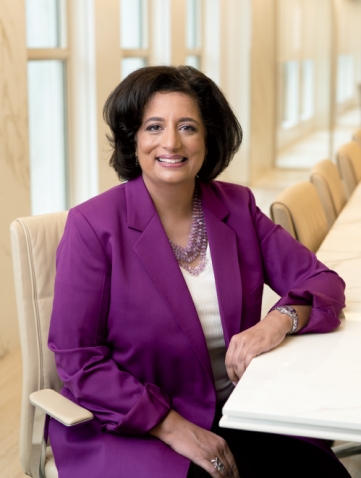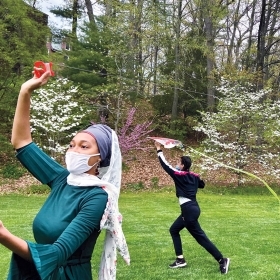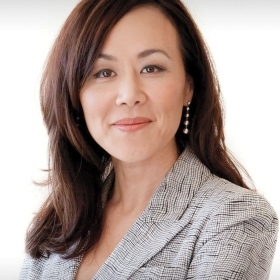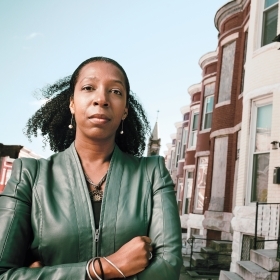Bruce Weller
A year ago, Muslim Advocates, an organization co-founded by Farhana Khera ’91, began work on a case in Phoenix that occurred before George Floyd was killed by Minneapolis police officers but was similarly disturbing. Muhammad Muhaymin, 43, who reportedly suffered from a mental illness and was disabled, wanted to take his service dog with him into a public restroom at a Phoenix community center. The center’s manager stopped him, telling him to leave his dog outside.
Phoenix police officers became involved, and they found an arrest warrant for Muhaymin due to a charge related to a misdemeanor. As they threw Muhaymin to the ground to handcuff him, one officer pressed his knee to Muhaymin’s neck for nearly eight minutes, killing him. The officers were never charged.
Muslim Advocates worked with Muhaymin’s family and local groups to seek justice, says Khera, who served as the group’s first executive director and president. Their work intensified after President Joe Biden took office, when the organization pushed for a federal investigation into the Phoenix Police Department.
“Part of our concern about the discrimination was not only that Muhammad was Black, but because of his faith identity, as he was screaming out for help and in pain, the police officer mocked him and said, ‘Well, Allah is not going to help you now,’” Khera says.
By August 2021, it was clear their efforts had been successful. On Aug. 5, the Department of Justice announced a federal civil rights investigation into the Phoenix Police Department. Experiencing such victories is “very gratifying,” Khera says.
Nassim Assefi ’91 is not surprised at Khera’s success: “It’s a reflection of Farhana’s prodigious leadership that Muslim Advocates is known and respected for celebrating the full array of American Muslims—in terms of race, sex, national origin, ability, income, education, gender identity, sexual orientation, religious sect, and level of religiosity.”
Khera’s interest in public policy dates back to Wellesley, where she arrived in the fall of 1987. She grew up in Painted Post, N.Y., a daughter of Pakistani immigrants, and learned about the College from an alum who lived in a neighboring town in upstate New York.
Khera’s mother was intent on her following in her father’s footsteps and becoming a doctor, so Khera took premed and political science classes during her first year. By her sophomore year, she realized she was not interested in a career in medicine, and she opted to double major in economics and political science instead. She wanted to pursue a career in the legal field, specifically in human rights.
As a result, she gravitated toward College Government, serving as a senator and eventually president. “That, I think, certainly furthered my interest in wanting to do something public service oriented,” she says.
Khera also participated in anti-apartheid protests to encourage Wellesley to divest from South Africa. The protests, her first, along with the release of Nelson Mandela from prison, the fall of the Berlin Wall, and the Tiananmen Square protests in China all happened while she was a student. Those history-making moments had a major impact on her.
“There was almost this idea of a new day dawning when it comes to universal human rights and democracy, and I think that further spurred me and my interest post-college to want to do work in advancing human rights,” she says.
At Wellesley, she and her older sister, Samira Khera ’90, co-founded Al-Muslimat, a faith group for Muslim students that is still thriving. Later, as part of the Wellesley in Washington program, Khera interned with Amnesty International and had the opportunity to attend meetings on Capitol Hill and take notes on human rights issues.
After Wellesley, she spent a year at the University of California Hastings College of the Law before moving back to New York to attend Cornell Law School when her father became ill. Upon graduation, she relocated to Washington, where she worked at law firms including Ross, Dixon & Masback and Hogan & Hartson.
As a corporate attorney, Khera worked on pro bono cases involving African American employees who were facing employment discrimination. It was her first experience doing legal work related to civil rights. “I found it very personally gratifying to help these victims of discrimination seek justice,” she says.
That led to a job on Capitol Hill in the spring of 1999 focusing on civil rights issues as part of U.S. Sen. Russ Feingold’s judiciary staff. While working for Feingold, a Wisconsin Democrat known for speaking out against the death penalty and racial profiling, Khera helped organize the first-ever congressional hearing on racial profiling. In the aftermath of 9/11, she realized the Muslim community needed a more powerful voice; several colleagues, who were attorneys and also Muslim, agreed. Khera took the exciting leap to head Muslim Advocates, which she likens to “jumping off a cliff without a parachute.”
In addition to working on civil rights cases, Khera has made national TV appearances, testified at and supported five congressional hearings on American Muslim civil rights issues, facilitated a meeting between President Obama and Muslim community advocates, worked to support passage of the NO BAN Act (a Muslim civil rights bill), and spoken with Facebook CEO Mark Zuckerberg about removing anti-Muslim hate speech from the site.
Colleague Brooke Frewing ’91 says of Khera, “At this stage, when a spokesperson is sought to discuss Muslim rights in America, Farhana always has a seat at the table.”
Having stepped down from her position at Muslim Advocates in July, Khera is looking toward the future and plans to continue to champion the causes she holds most dear. Rep. Rashida Tlaib of Michigan comments, “Her partnership in advancing civil rights and justice for all, especially on the NO BAN Act, has been invaluable in our fight for progress. With Farhana’s help, along with coalition members, Congress passed the NO BAN Act out of the House in April of this year. I am so proud of her—and cannot wait to see what she does next.”
“Today, we see a real threat from those who do not believe in an inclusive, pluralistic America and one in which all are truly entitled to equal rights under the law,” Khera says. “I think the struggle today and going forward is really a fight for the soul of our country and our democracy.”








We ask that those who engage in Wellesley magazine's online community act with honesty, integrity, and respect. (Remember the honor code, alums?) We reserve the right to remove comments by impersonators or comments that are not civil and relevant to the subject at hand. By posting here, you are permitting Wellesley magazine to edit and republish your comment in all media. Please remember that all posts are public.